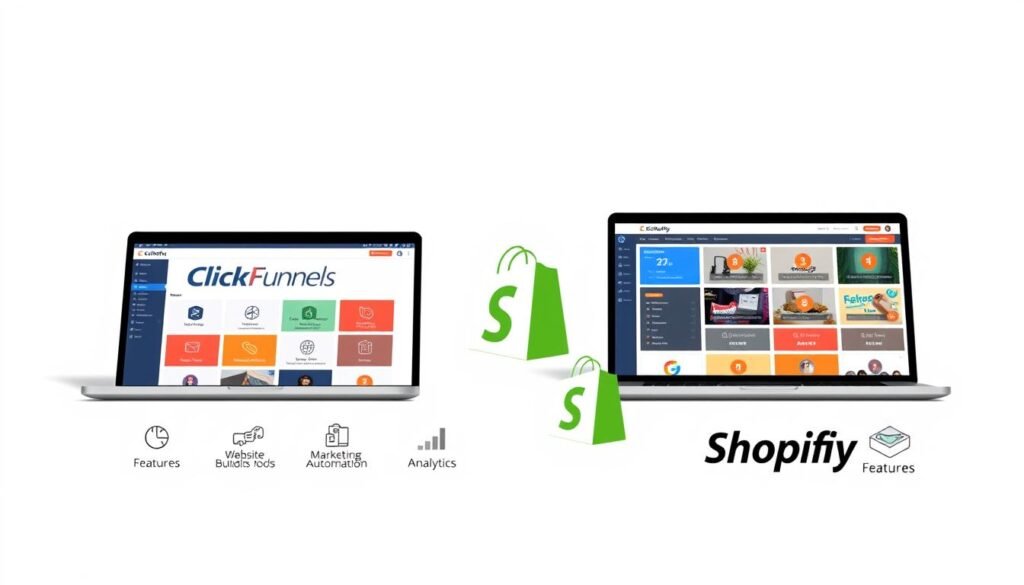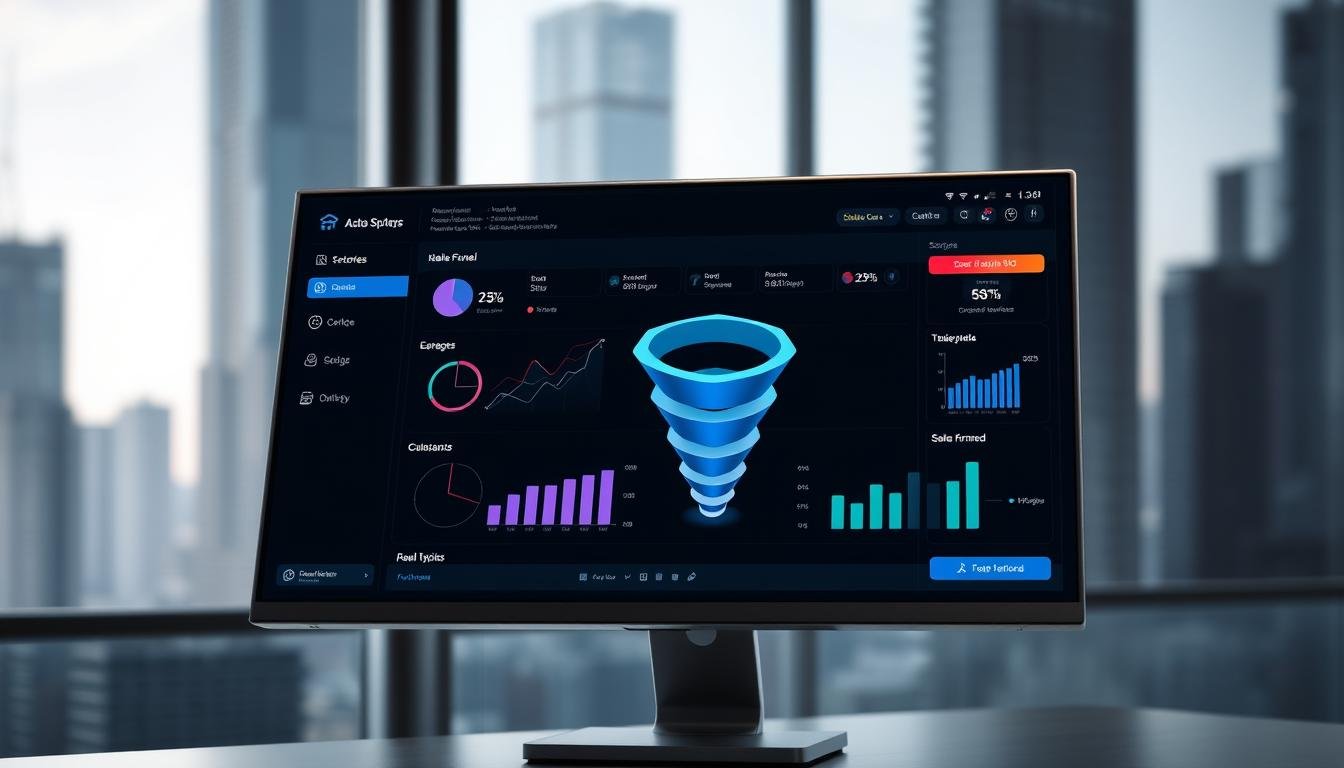E-commerce businesses are always seeking ways to enhance their sales processes. A well-designed sales funnel is key to turning visitors into customers. Interestingly, businesses using sales funnel software often see a 25% increase in sales.
If you’re an e-commerce entrepreneur, you’ve probably heard of Shopify. It’s a robust platform for setting up online stores. But, you might wonder if ClickFunnels could be a good alternative or addition to Shopify, focusing on sales funnel creation.
This article delves into ClickFunnels’ capabilities in e-commerce and compares it with Shopify. We’ll look into whether they can replace Shopify or if they cater to different needs in the e-commerce world.
Table of Contents
- 1 What Are ClickFunnels and Shopify?
- 2 The Core Differences Between ClickFunnels and Shopify
- 3 Understanding ClickFunnels’ E-Commerce Capabilities
- 4 Shopify’s E-Commerce Ecosystem
- 5 Pricing Comparison: ClickFunnels vs. Shopify
- 6 User Experience and Learning Curve
- 7 ClickFunnels Interface and Usability
- 8 Shopify Interface and Usability
- 9 Marketing and Conversion Optimization
- 10 Customer Support and Community Resources
- 11 Scalability and Growth Potentials
- 12 Integration Capabilities
- 13 Use Cases: When to Choose ClickFunnels Over Shopify
- 14 Hybrid Approach: Using ClickFunnels with Shopify
- 15 Conclusion: Can ClickFunnels Replace Shopify?
Key Takeaways
- Understanding the primary functions of ClickFunnels and Shopify.
- Comparing the e-commerce features of both platforms.
- Evaluating the effectiveness of sales funnels in e-commerce.
- Assessing whether ClickFunnels can be used as a standalone e-commerce solution.
- Identifying the ideal use cases for each platform.
What Are ClickFunnels and Shopify?
For any e-commerce entrepreneur, grasping the core functionalities of ClickFunnels and Shopify is essential. Navigating the complex online sales world requires understanding how these platforms can meet your business needs.
ClickFunnels and Shopify serve different aspects of e-commerce, each with unique strengths. To make an informed decision, it’s vital to comprehend their primary functions. This knowledge will help you leverage them to enhance your online business.
ClickFunnels: A Sales Funnel Builder
ClickFunnels is a funnel builder designed to create high-converting sales funnels. It guides customers through a seamless buying process. You can build landing pages, sales pages, and complete sales funnels without needing extensive technical knowledge.
Its main goal is to create an online sales funnel that boosts conversions. Using the platform streamlines your sales process. It makes it easier for customers to explore your offerings.

Shopify: A Dedicated E-Commerce Platform
Shopify is a robust e-commerce platform for setting up and managing an online store. It offers tools and features for a successful e-commerce business, from product management to order fulfillment.
With Shopify, you can customize your store, manage inventory, process payments, and handle shipping. It supports businesses of all sizes, providing scalability and flexibility.
Understanding the distinct purposes of ClickFunnels and Shopify helps you decide which platform aligns with your business goals. Or, you might consider using both together for greater benefits.
The Core Differences Between ClickFunnels and Shopify
Choosing between ClickFunnels and Shopify requires understanding their distinct business models and architectures. This knowledge is key to selecting the right platform for your e-commerce needs.
Business Model Focus
ClickFunnels is a sales funnel software aimed at guiding customers through conversion-focused steps. It excels in marketing automation, helping businesses streamline their sales and boost conversions.
Shopify, in contrast, is a dedicated e-commerce platform designed for managing online stores. It offers tools for inventory, product catalog, and order processing.
Platform Architecture
ClickFunnels is built for creating and managing sales funnels. It includes landing page creation, email marketing, and affiliate management. This makes it perfect for optimizing sales processes.
Shopify, with its e-commerce infrastructure, supports storefront design, product management, shipping, and payment processing. It’s ideal for managing a complete online store.

Target Users
ClickFunnels is geared towards businesses and entrepreneurs aiming to enhance their sales funnels and automate marketing. It suits digital marketers, online course creators, and those focused on conversion rate optimization.
Shopify, by contrast, serves a wider range of e-commerce businesses. It caters to startups, large enterprises, retailers, wholesalers, and dropshippers looking to grow their online presence.
| Feature | ClickFunnels | Shopify |
|---|---|---|
| Primary Focus | Sales Funnel Creation | E-commerce Store Management |
| Key Features | Marketing Automation, Sales Funnel Templates | Inventory Management, Product Catalog Management |
| Target Users | Digital Marketers, Online Course Creators | E-commerce Businesses, Retailers, Wholesalers |
Understanding ClickFunnels’ E-Commerce Capabilities
This platform has become a powerful tool for e-commerce businesses. It offers a variety of features that enhance online sales funnels and improve conversion rates. As an e-commerce platform, it simplifies the sales process. This makes it easier for businesses to turn leads into customers.
Sales Funnel Creation and Templates
It excels in creating effective sales funnels and comes with a range of pre-designed templates. These templates are designed to optimize conversions, helping you maximize your sales.
Key Benefits of ClickFunnels Templates:
- Pre-designed for conversion optimization
- Easy to customize to fit your brand
- Streamlines the sales process
Order Processing Features
ClickFunnels also offers robust order processing features. These features simplify managing your sales. You can track orders, manage customer information, and process payments all within the platform. This integrated approach reduces the complexity of e-commerce management.
| Feature | Description | Benefit |
|---|---|---|
| Order Tracking | Monitor the status of customer orders | Improved customer satisfaction |
| Customer Management | Store customer information for future marketing | Enhanced customer relationships |
| Payment Processing | Securely process transactions | Reduced risk of payment errors |
Integration with Payment Gateways
ClickFunnels enhances its e-commerce capabilities by integrating with various payment gateways. This allows you to accept payments securely from customers. The flexibility ensures you can cater to a wide range of customers, regardless of their preferred payment method.
Popular Payment Gateways Supported by ClickFunnels:
- PayPal
- Stripe
- Authorize.net
By integrating with these payment gateways, it streamlines your e-commerce operations. It manages sales funnels to payment processing in one place.
Shopify’s E-Commerce Ecosystem
Shopify’s e-commerce ecosystem is built to empower businesses. It offers a wide array of tools and features for managing and growing online stores. These capabilities help in creating a seamless shopping experience for customers, from setting up the store to processing payments.
Store Creation and Management
Setting up an online store with Shopify is easy, thanks to its intuitive interface and detailed setup process. You can pick from various customizable themes to reflect your brand’s identity. Managing your store’s settings is also straightforward.
Key Features of Shopify Store Creation:
- Customizable themes to match your brand
- User-friendly dashboard for managing store settings
- Drag-and-drop functionality for easy page creation
Product Catalog Features
Efficiently managing your product catalog is essential for any e-commerce business. Shopify provides robust features for organizing products, variants, and inventory effectively.
| Feature | Description | Benefit |
|---|---|---|
| Product Variants | Manage different versions of a product | Simplifies inventory management |
| Inventory Tracking | Monitor stock levels in real-time | Reduces overselling and stockouts |
| Product Reviews | Allow customers to review products | Enhances customer engagement and trust |
Built-in Payment Processing
Shopify offers built-in payment processing through Shopify Payments. This makes managing transactions easier. It simplifies the checkout process, reducing cart abandonment rates and improving customer satisfaction.
By integrating payment processing within your Shopify store, you can offer a seamless checkout experience. This supports multiple payment methods and currencies. It enhances customer convenience and helps expand your business globally.
Pricing Comparison: ClickFunnels vs. Shopify
When choosing between ClickFunnels and Shopify, it’s vital to understand their pricing models. Both platforms have plans tailored to various business needs. Yet, the costs and features differ significantly across each plan.
ClickFunnels Pricing Plans
They provide several pricing plans for businesses at different growth stages. These plans are structured around the features needed for creating and managing sales funnels.
- $15/month (Basic Plan): Perfect for small businesses or startups, this plan offers basic features for sales funnel creation.
- $49/month (Pro Plan): Ideal for growing businesses, this plan includes advanced features like increased storage and the removal of ClickFunnels branding.
- $99/month (Funnel Hacker Plan): Designed for established businesses, this plan adds features like actionetics and back-end fulfillment.
- $299/month (All-in-One Funnel Hacker Plan): The premium plan offers unlimited funnels, contacts, and advanced marketing automations.
As noted by George Petropoulos, the founder of Passive Tactics:
“The key to maximizing ROI with ClickFunnels lies in understanding the pricing and leveraging the right plan for your business needs.”
Shopify Pricing Plans
Shopify also offers a variety of pricing plans for e-commerce businesses. These plans vary based on the scale of operations and the features needed.
| Plan | Monthly Cost | Transaction Fees | Key Features |
|---|---|---|---|
| Basic Shopify | $29 | 2.9% + 30¢ per transaction | Basic e-commerce features, unlimited products |
| Shopify | $79 | 2.6% + 30¢ per transaction | Additional features like gift cards, professional reports |
| Advanced Shopify | $299 | 2.4% + 30¢ per transaction | Advanced features including third-party calculated shipping rates |
According to Shopify’s documentation,
“Choosing the right plan depends on your business size, sales volume, and specific e-commerce needs.”
In conclusion, both ClickFunnels and Shopify offer various pricing plans for different business needs. By carefully evaluating these plans, businesses can make an informed decision about which platform is more cost-effective for their specific needs.
User Experience and Learning Curve
The ease of use and overall user experience of ClickFunnels and Shopify vary significantly, impacting your choice of e-commerce platform. As you navigate through these platforms, understanding their interfaces and usability is key for making an informed decision.
ClickFunnels Interface and Usability
ClickFunnels focuses on creating sales funnels, with a streamlined interface guiding users through setting up a funnel. Its drag-and-drop editor makes adding elements and customizing funnel pages easy. Yet, users new to sales funnels might find the concept and numerous options overwhelming at first.
ClickFunnels’ interface is intuitive for those familiar with sales funnel concepts. But, it may require a learning curve for beginners. The platform offers a range of templates and a straightforward editing process, making it accessible to users without extensive technical knowledge.
One of ClickFunnels’ key features is its ability to integrate various marketing and sales tools into a single funnel. This enhances the user experience by providing a complete solution for managing sales processes.
I am an independent ClickFunnels Affiliate, not an employee. I receive referral payments from ClickFunnels. The opinions expressed here are my own and are not official statements of ClickFunnels or its parent company, Etison LLC.
Shopify Interface and Usability
Shopify, a dedicated e-commerce platform, offers a more traditional online store experience. Its interface is designed to be user-friendly, with a dashboard for managing products, orders, and customer data.
Shopify’s usability is enhanced by its extensive documentation and support resources. This makes it easier for new users to start and for experienced users to optimize their stores.
To further illustrate the differences in user experience between ClickFunnels and Shopify, consider the following comparison table:
| Feature | ClickFunnels | Shopify |
|---|---|---|
| Primary Focus | Sales Funnels | E-commerce Store Management |
| Interface | Drag-and-drop funnel builder | Comprehensive dashboard for store management |
| Learning Curve | Moderate; requires understanding of sales funnels | Relatively low; user-friendly for e-commerce management |
| Customization | High; extensive template and element library | High; wide range of themes and apps available |
By examining the user experience and learning curve of both ClickFunnels and Shopify, you can better understand which platform aligns with your business needs and technical comfort level.
Marketing and Conversion Optimization
Effective marketing automation and conversion optimization are key to e-commerce success. Both ClickFunnels and Shopify offer unique solutions. As an online business owner, you’re likely seeking ways to streamline marketing and boost conversions.
Understanding the marketing capabilities of both platforms is essential. Let’s explore ClickFunnels’ marketing automation and Shopify’s marketing tools in detail.
ClickFunnels’ Marketing Automation
ClickFunnels provides advanced marketing automation features to optimize sales funnels. Key benefits include:
- Automated email marketing: Create automated email sequences to nurture leads and encourage conversions.
- Contact segmentation: Segment contacts based on behavior and preferences for targeted marketing campaigns.
- Follow-up funnels: Create follow-up funnels that automatically respond to customer actions.
These features save time and boost marketing campaign effectiveness. Automating routine tasks allows you to focus on strategy and creativity.
Shopify’s Marketing Tools
Shopify offers a range of marketing tools for conversion optimization. Notable features include:
- Discount and promotion management: Create and manage discounts, promotions, and sales campaigns.
- Email marketing integration: Integrate email marketing campaigns with Shopify to effectively reach customers.
- SEO optimization: Shopify’s built-in SEO tools improve your store’s search engine visibility.
Using these tools can enhance store visibility, drive sales, and improve customer engagement.
In conclusion, both ClickFunnels and Shopify provide robust marketing and conversion optimization capabilities. Understanding each platform’s strengths helps you make informed decisions for your e-commerce needs.
Customer Support and Community Resources
When you’re in the e-commerce world with ClickFunnels or Shopify, help is always near. Both platforms know how vital it is to offer top-notch support to their users.
ClickFunnels Support Options
ClickFunnels has several support channels, like live chat, email, and a vast knowledge base. Their team is ready 24/7 to help with any problems or questions you might have.
Shopify Support Ecosystem
Shopify has a robust support system, including 24/7 live chat, email, and phone support. They also have a large community forum and a detailed help center.
| Support Feature | ClickFunnels | Shopify |
|---|---|---|
| Live Chat Support | Available 24/7 | Available 24/7 |
| Email Support | Available | Available |
| Phone Support | Not Available | Available 24/7 |
| Community Forum | Available | Available |
| Knowledge Base | Extensive | Extensive |
Scalability and Growth Potentials
Scalability is vital when picking an e-commerce platform, as it affects a business’s growth. As businesses grow, their e-commerce solutions must adapt to higher traffic, larger product catalogs, and more complex operations.
ClickFunnels and Shopify are both designed for growing businesses but differ in their approach to scalability. It’s essential for businesses aiming to expand their online presence to understand these differences.
ClickFunnels for Growing Businesses
ClickFunnels excels in creating sales funnels that boost conversions. Its scalability focuses on managing increased marketing efforts and sales processes. Key features that support growth include:
- Customizable sales funnels tailored to specific marketing campaigns
- Integration with various payment gateways for smooth transactions
- Upsell and downsell features to maximize revenue from each customer
Yet, ClickFunnels might need extra integrations or workarounds for complex product catalogs or large inventory management.
Shopify for Growing Businesses
Shopify, a full-fledged e-commerce platform, is designed to manage all aspects of online store operations. Its scalability features are aimed at supporting large product catalogs, complex inventory management, and high-volume sales.
Key scalability features of Shopify include:
- Robust inventory management tools for large and complex product catalogs
- Advanced shipping and fulfillment options to streamline order delivery
- A wide range of third-party apps and integrations to extend platform functionality
Shopify’s scalability makes it perfect for businesses expecting significant growth in products or sales volume.
In conclusion, while both ClickFunnels and Shopify offer scalability, their growth potentials differ based on their design and features. Businesses must weigh their specific needs when deciding between these platforms.
Integration Capabilities
When selecting between ClickFunnels and Shopify for your e-commerce venture, integration capabilities are critical. Both platforms boast a variety of integrations to boost your business operations. Yet, they vary in their integration ecosystems and approaches.
ClickFunnels’ Integration Ecosystem
ClickFunnels boasts a strong integration ecosystem. It enables you to link your sales funnels with numerous third-party applications. This includes integrations with leading email marketing tools, payment gateways, and other business apps. Key integrations on ClickFunnels include:
- Email Marketing Tools: Connect with services like Mailchimp and AWeber to automate your email marketing campaigns.
- Payment Gateways: Link with major payment processors like Stripe and PayPal for seamless transactions.
- Other Business Apps: Integrate with a variety of other business applications to streamline your operations.
Shopify’s App Store and Integrations
Shopify, in contrast, has an extensive App Store with thousands of integrations. This vast ecosystem enables Shopify users to customize their stores with a wide array of functionalities. These include marketing and sales, inventory management, and shipping. The benefits of Shopify’s App Store include:
- Extensive Customization: With thousands of apps available, you can tailor your Shopify store to meet your specific business needs.
- Enhanced Functionality: Integrations range from simple tweaks to complex solutions for various business processes.
- Regular Updates and Support: Many apps are regularly updated and supported by their developers, ensuring compatibility and security.
In conclusion, while both ClickFunnels and Shopify offer robust integration capabilities, Shopify’s extensive App Store provides a broader range of options for customizing and enriching your e-commerce platform. Your decision between the two should align with your specific business needs and the integrations most critical to your operations.
Use Cases: When to Choose ClickFunnels Over Shopify
ClickFunnels and Shopify serve different e-commerce needs, making it vital to choose the right platform for your business. Your decision should be based on your business model, marketing strategies, and operational needs.
Ideal Scenarios for ClickFunnels
ClickFunnels excels for businesses that need complex sales funnels and automated marketing. If your business focuses on:
- Creating multi-step sales funnels to guide customers through a buying process
- Utilizing marketing automation to nurture leads and enhance customer engagement
- Offering a range of digital products or services that require a structured sales process
then ClickFunnels is likely the better choice. Its features are designed to optimize sales funnels, making it an ideal sales funnel software for businesses looking to streamline their sales processes.
When Shopify Is the Better Choice
Shopify, on the other hand, is more suited for businesses needing a full-featured e-commerce platform. If your business involves:
- Managing a large inventory of physical or digital products
- Needing robust storefront customization and management features
- Relying on built-in payment processing and shipping integrations
then Shopify is the more appropriate e-commerce platform. Its extensive features support the creation and management of online stores, making it a preferred choice for businesses with complex e-commerce needs.
In conclusion, the decision between ClickFunnels and Shopify should be based on your specific business requirements. By understanding the strengths of each platform, you can make an informed decision that aligns with your business goals.
Hybrid Approach: Using ClickFunnels with Shopify
Integrating ClickFunnels with Shopify creates a robust e-commerce solution. This hybrid strategy combines ClickFunnels’ advanced sales funnel tools with Shopify’s extensive e-commerce capabilities. It’s a powerful way to enhance your online store and sales funnels.
Integration Methods
Several methods exist to link ClickFunnels with Shopify, streamlining your online store and sales funnel management. Key integration methods include:
- Using ClickFunnels’ native integration with Shopify to sync products, customers, and orders.
- Leveraging third-party apps available on both platforms to enhance functionality.
- Utilizing APIs and webhooks for more customized integrations.
These methods ensure a smooth data flow between ClickFunnels and Shopify. This keeps your sales funnels and online store current and efficient.
Benefits of a Combined Strategy
Using a hybrid approach with ClickFunnels and Shopify brings numerous advantages, including:
- Enhanced Sales Funnel Capabilities: ClickFunnels’ advanced features enable targeted marketing campaigns.
- Comprehensive E-commerce Features: Shopify’s robust platform solidifies your online store’s foundation.
- Improved Customer Experience: Integrating both platforms offers a more streamlined and personalized shopping experience.
- Increased Flexibility: A hybrid approach allows you to pick the best features from both platforms, meeting your business needs.
By merging ClickFunnels and Shopify, you establish a formidable e-commerce ecosystem. This ecosystem boosts sales, improves customer experience, and gives you a competitive edge in the market.
Conclusion: Can ClickFunnels Replace Shopify?
You now grasp the fundamental differences between ClickFunnels and Shopify. The choice hinges on your business’s specific needs. If focusing on sales funnels is key, ClickFunnels stands out. It’s equipped with features to enhance sales processes and marketing efforts.
For a broad e-commerce solution, managing various products, inventory, and shipping, Shopify is superior. It caters to businesses of all scales, ensuring a smooth shopping experience for customers.
While ClickFunnels has some e-commerce functionalities, it can’t fully replace Shopify’s vast capabilities. Yet, you can integrate ClickFunnels with Shopify. This hybrid strategy allows you to tap into the best of both worlds, boosting your sales funnel and driving traffic to your Shopify store.
Your decision between ClickFunnels and Shopify should align with your business objectives. By understanding each platform’s strengths, you can make a choice that propels your e-commerce success.
I am an independent ClickFunnels Affiliate, not an employee. I receive referral payments from ClickFunnels. The opinions expressed here are my own and are not official statements of ClickFunnels or its parent company, Etison LLC.




